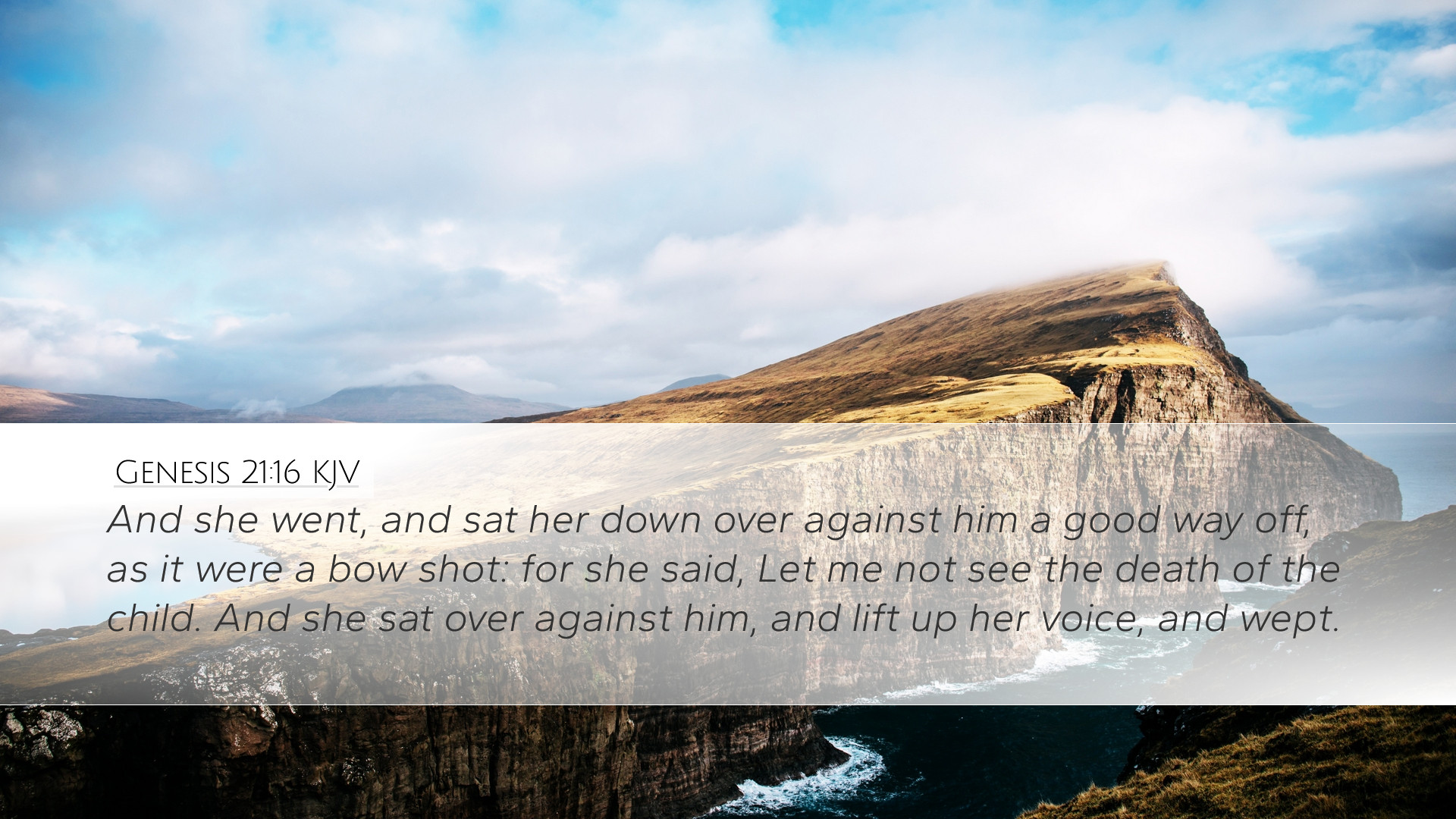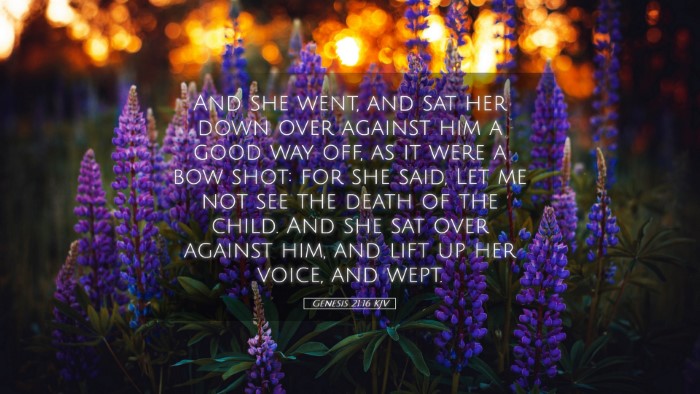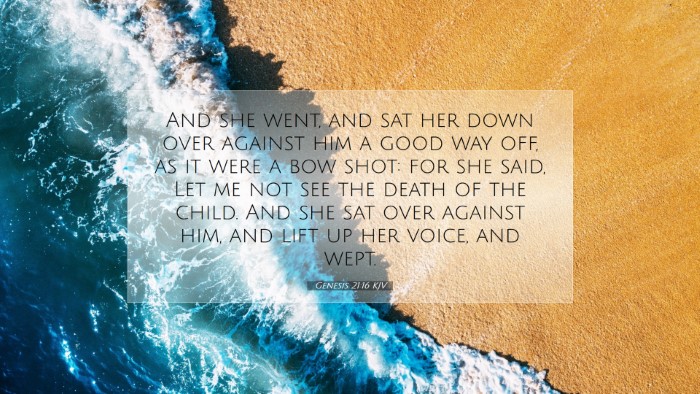Commentary on Genesis 21:16
Genesis 21:16 (KJV): "And she went, and sat her down over against him a good way off, as it were a bowshot: for she said, Let me not see the death of the child. And she sat over against him, and lifted up her voice, and wept."
Context and Background
In this passage, we have a poignant moment in the life of Hagar and her son Ishmael. After the birth of Isaac, tensions arise in Abraham's household. Sarah, feeling threatened by the presence of Hagar and her son, insists that Abraham send them away. God reassures Abraham about the future of Ishmael, but Hagar's situation remains dire.
Insights from Public Domain Commentaries
Matthew Henry's Commentary
Matthew Henry emphasizes the emotional turmoil of Hagar. He writes about her "deep despair" as she finds herself in a wilderness without sustenance or support. Henry notes the significant imagery of Hagar sitting at a distance from Ishmael, illustrating both her deep anguish and her desire to spare him the sight of her sorrow. This act encapsulates a mother's instinct to protect her child from pain.
- Distance and Despair: Henry points out that the distance Hagar places between herself and Ishmael reflects the emotional burden she carries. She cannot bear to witness the suffering of her child, highlighting the theme of maternal love in moments of crisis.
- The Cry of a Mother: The phrase "lifted up her voice, and wept" is significant. Henry notes that this is not merely a expression of grief but a heartfelt desperation, appealing to God for assistance. It serves as a reminder of the power of prayer in times of suffering.
- God’s Mercy: Henry reassures readers that even in despair, God hears the cries of those who are marginalized. He highlights the eventual divine intervention where God listens to the voice of Ishmael, affirming Hagar's role as a mother and the future promise for Ishmael.
Albert Barnes' Notes on the Bible
Albert Barnes provides a theological perspective on the passage, connecting Hagar's plight to the broader narrative of God's covenantal promises. Barnes considers the symbolic significance of Hagar as representative of the struggles faced by those outside the covenant community.
- The Wilderness Experience: Barnes elaborates on the "wilderness" metaphor, indicative of both physical and spiritual desolation. Hagar's experience serves to demonstrate how God cares for those in despair, often in the most unexpected circumstances.
- Divine Response: He emphasizes that although Hagar felt abandoned, God was omnipresent in her suffering. Barnes highlights that God's assurance to Hagar not only concerns Ishmael's survival but also his multiplicity as a future nation, emphasizing God's overarching purpose.
- Lessons on Faith: Barnes encourages readers to reflect on their faith in times of trial. Hagar's encounter with divine provision gives hope and teaches reliance on God, despite immediate despair.
Adam Clarke's Commentary
Adam Clarke delves deeper into the emotional attributes of Hagar's situation, analyzing the dynamics of social and familial tension. Clarke emphasizes Hagar’s emotional state and the implications of her actions in this critical moment.
- Psychological Insights: Clarke discusses the psychological effects of abandonment on Hagar, suggesting she experienced feelings of rejection that many today can relate to. The act of placing a distance between herself and Ishmael underscores her profound grief, a real human experience that is relatable for many.
- Prayer and Weeping: In reflecting on Hagar's weeping, Clarke notes the importance of expressing sorrow to God. His commentary suggests that even the unspoken cries of our hearts are heard by God, reinforcing that prayers do not have to be verbal to reach Him.
- Symbolism of the Bowshot Distance: The distance of a bowshot symbolizes a significant yet attainable distance, representing the divide between hope and despair. Clarke interprets this distance metaphorically, indicating that often in life, hope feels just out of reach during trials.
Thematic Exploration
The narrative of Hagar and Ishmael is rich with themes that resonate with pastoral care, theological training, and scholarly examination.
- The God Who Sees: One of the most compelling themes in Genesis 21 is the nature of God as the One who sees (El Roi). Hagar's experience serves as a reminder that amid despair, God's sight and presence accompany us through grief and trials.
- Motherhood and Sacrifice: The explicit emotional context of Hagar's actions brings forth a deeper understanding of the sacrifices mothers make for their children. It invites further reflection on maternal love, suffering, and God's grace in sustaining families.
- The Gospel Reflection: The passage provides a precursor to the greater narrative of redemption. Just as Hagar's despair led to divine intervention, so does the New Testament demonstrate God's love for the lost, inviting all into His family, irrespective of their past.
Conclusion
Genesis 21:16 serves as a profound reminder of the challenges faced in life's journey, particularly for those who find themselves in marginalized situations. The commentaries from Matthew Henry, Albert Barnes, and Adam Clarke provide valuable insights that encourage reflection on God's faithfulness, the significance of heartfelt prayer, and the relentless love of a mother. This passage calls for compassionate understanding within the church, urging leaders and congregants alike to recognize the divine presence in moments of deep distress and to bolster faith in God's promises.


